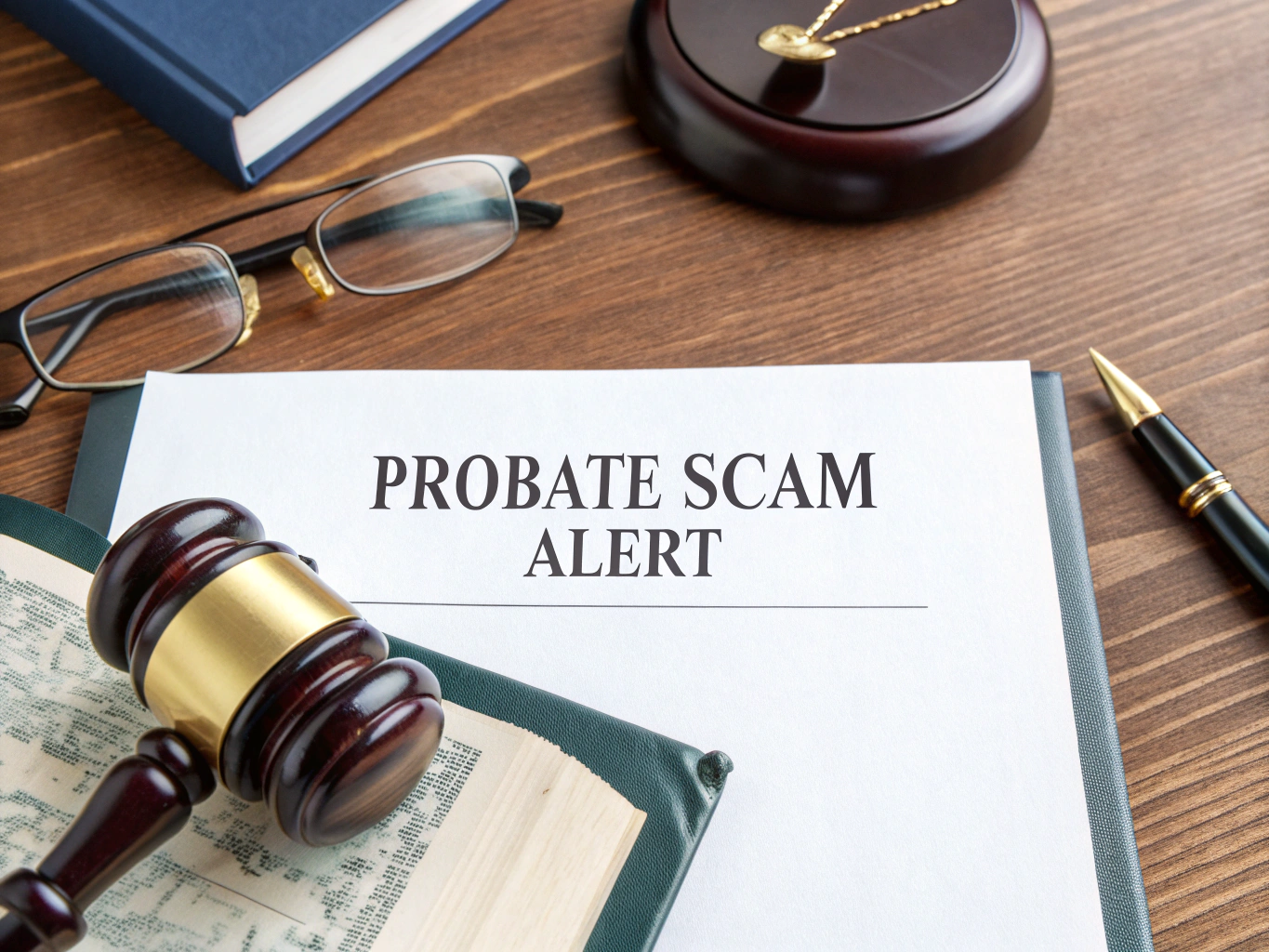*updated 6-13-25
Examines probate scams in Texas with a focus on the legal process, estate administration, and fraud prevention for homeowners and heirs. Analyzes scam types, executor responsibilities, and digital risks within the probate process, referencing Texas Estates Code and elder fraud data to guide families through secure estate transfers in 2025

How Do I Avoid Probate Scams in Texas?
Selling a home through probate in Texas isn’t exactly simple to begin with, and it gets even messier if someone tries to take advantage while you’re already juggling the details.
But here’s the hard truth. Probate scams in Texas are becoming more common, and they prey on people right when they’re at their most vulnerable.
Whether you’re a family member, an executor of an estate, or an interested person listed in the decedent’s estate, it pays to know what to look out for.
Understanding the Probate Process in Texas
Probate is the legal process that settles a loved one’s affairs after they pass away.
That means everything from handling bank accounts, estate assets, and life insurance policies to making sure the right property ends up with the rightful heirs.
If there’s a will, it’s up to the executor or administrator (sometimes called the personal representative) to file it with the probate court.
If there’s not, Texas law decides how things get split up.

In Texas, the steps look like this:
- File a petition with the probate court to get the will admitted (or to appoint an administrator if there’s no will). This is public record, and it happens in your local county—think Travis County, Bexar County, or Harris County.
- Once the court gives the green light, the Executor or Administrator notifies creditors and inventories all estate property—real estate, valuables, even those old checking accounts.
- The personal representative pays any debts, funeral expenses, and Estate Taxes out of the estate. Sometimes, this means selling assets just to cover everything.
- When all is said and done, whatever remains is distributed to the rightful beneficiaries under the will—or, if there isn’t one, according to Texas Estates Code. This covers who gets what and keeps things in line with state law.
But not every case is cut and dried.
If there’s a will contest, a dispute over who’s supposed to get what, or concerns about undue influence, it can turn into full-on probate litigation.
Sometimes, this even ends up in a trial court.
Don’t Fall for These Common Probate Scams
Here’s the thing: scammers love chaos.
The probate process is full of moving parts, legal terms, and deadlines—which is perfect for anyone looking to pull off fraudulent actions or probate disputes.
Let’s break down a few real-world examples:
- Probate Avoidance Scam: Someone pitches you a pricey “living trust kit” or some other fraudulent product that promises to let you skip probate altogether. They pocket your money, and you end up with a stack of paperwork that doesn’t hold up under Texas law.
- Inheritance/Estate Tax Scam: Someone claims to be from a bank, the sheriff’s office, or even a “Texas Probate Fraud Lawyer.” They say you’re in line for a huge inheritance—if you’ll just pay some bogus estate tax up front. The problem? Texas doesn’t have an inheritance tax. If someone wants cash up front, it’s likely a scam.
- Fraudulent Listings Scam: Scammers scour public records for probate properties, then post fake rental ads on Craigslist and similar sites. They collect deposits and vanish, leaving families and estate planning attorneys to clean up the mess.

Worse, sometimes the scams come from inside the house—literally.
An executor of an estate or personal representative could try to pull off a fraudulent transfer of property or money, hide assets, or file forged documents with the court.
If you notice any missing assets, suspicious formal accountings, or false information, it’s time to consult a real probate lawyer or Texas executor fraud lawyer. And do it fast.
What to Watch For (and What to Do)
No one wants to believe it could happen in their own family.
But the numbers don’t lie: up to 10% of elder fraud cases in Texas are connected to probate fraud.
Spotting red flags early can save your inheritance, your sanity, and sometimes your entire deceased’s estate.
If you spot something off—a will that looks suspicious, pressure to sign documents you don’t understand, or an executor misconduct scenario—don’t go it alone.
Here’s what helps:
- Get legal advice from an estate law expert.
- Ask for expert witnesses if your case heads to court.
- Keep records of everything—emails, phone calls, bank transfers.
- If needed, report fraudulent activities to local law enforcement.
Sometimes, it takes a constructive trust, a court-ordered fix, or surcharge actions to right the ship and get assets back for the rightful beneficiaries.
It might also mean bringing in formal accountings, challenging forged documents, or calling out an executor’s misconduct.
Need Help? We’re Here.
We’ve helped families all over Texas—Dallas, San Antonio, Fort Worth, Arlington — figure out probate cases, home sales, and even battles with tricky estate matters.
Whether you’re worried about fraudulent intent, lost estate assets, or just want to keep the process smooth, we’re here for you.
Have questions or want a free consultation?
Give us a call at (214) 833-6269 or use our contact form.
Your information is confidential, and you’ll get straightforward advice—no pressure, just clear answers about your rights and options.
We’ll help you figure out what’s best for your family, whether that means selling a probate property, working with an estate planning attorney, or standing up for your rights as an interested person.
If you’re interested in understanding probate better and navigating it seamlessly, reach out to us at (214) 833-6269 or complete our quick online form

**Disclaimer: The information on this page is intended for general guidance on probate scams in Texas and is not a substitute for legal advice. Every probate case is unique, and the type of fraud, inheritance rights, and required legal action may differ depending on your specific situation. If you suspect issues such as a fraudulent will, improper handling of estate assets, or questions about a death certificate or sufficient evidence in Probate/Estate matters, consult with a qualified attorney who practices in estate law, elder law, or probate litigation. Our team is not acting as your legal representation; we encourage you to seek personalized legal services for your best interests. For help with legal representation or inquiries related to our practice areas, contact us directly.
